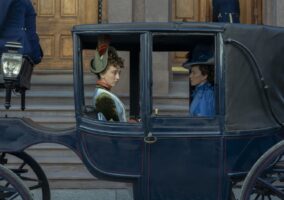Jenna Coleman and Peter Capaldi in BBC America’s “Doctor Who.”
Ah, there he is. There’s the Doctor we were waiting for. Bold, funny, smart, egotistical, judgmental, and alien to his core (to the point that he needs flash cards in order to offer condolences), this is the kind of Doctor we want to see from Peter Capaldi, not the guitar playing jokester of the season premiere. We touched on this a bit in this week’s podcast, but the gist of it is, as much as we love the idea of Peter Capaldi as the Doctor, we haven’t always liked the reality of it. Which, in a larger sense, places him alongside … every other actor who ever played the Doctor because no one actor could ever satisfy all of Who fandom at the same time. It’s a quality that’s inherent to a character who changes his face and, to a certain extent, his personality every few years: no one can ever agree on what the character is and no actor can ever truly embody any one person’s conception of the character. As much as this sounds like a complaint, it’s not. That unique form of tension is what makes the character of the Doctor so interesting. He’s like a cut gem. He changes form and color depending on which way the light hits it, but the core of him remains the consistently the same.
But you could argue that Capaldi’s Doctor has always been bold, funny, smart and egotistical. And we’re starting to think those qualities, which are found in almost all iterations of the Doctor (a few have been not quite so funny and ) need to be doled out in precise amounts for the combination to work. Looking at it this way, the Doctor isn’t a cut gem, he’s a recipe. And with each regeneration, the proportion of ingredients gets slightly changed in order to suit the actor who’s playing him. So depending on which analogy you buy more, this was either the episode where the light hit Capaldi in just the right way or the episode in which the creative team mixed up all the ingredients in the exact right proportions for him. We’re not sure why this particular take on Capaldi’s Doctor is the one to finally appeal the most to us and there’s a huge part of us that doesn’t want to analyze it in order to find out. Suffice it to say that this Doctor pushed all our buttons. Whatever the case or reason, we liked the Capaldi so much better this week than when he was overdoing the aging rock star schtick in the season premiere.
A big part of why this episode appealed to us was simply because the universe, the life of the Doctor, and (for now) the life of the companion are all NOT in any real danger. Sometimes, rather than some grand operatic disaster, we’d rather just see a couple of heroes save a couple of people from a couple of monsters. Sometimes, you just want the Doctor to hang out underneath a Scottish lake for a while to see what happens. This was a classic Who “base under siege” episode and we’d argue it’s one of the best ones we’ve seen in quite a few seasons – and we’re only at the halfway point of the story. Which reminds us: we’re starting to really dig the strict two-parter format of this season. While it could be argued that it leaves us with some filler material rather than a lean near-hour story done in one (especially in the first two-parter of the season), it gives the series the feel of a serial, which is, after all what Doctor Who was for a large portion of his original run.
Anyway, “base under siege.” What’s great about these kinds of Who stories, when they’re done well, is that they tend to introduce a bunch of really likable or interesting characters, some of whom get killed and almost all of whom you’ll never see again after the story concludes. When it’s done right, it tends to freshen up a Doctor/companion relationship by giving it several people to bounce off of at once. We found the crew here to all be more or less likable people with distinct personalities, which instantly gives the story some stakes because you find yourself hoping that most of them survive. It was great to see a hearing-impaired character among the crew, but it would have been nice if she was simply there to make it more diverse rather than because a part of the story hinges on her ability to lip-read. And not to be too much of a nerd about it, but would a 22nd-Century hearing-impaired person really need their own interpreter?
There was a brief, odd “don’t go native” moment between the Doctor and Clara that struck us as extremely forced, considering Clara wasn’t doing anything but exhibiting the normal adventurous traits the Doctor looks for in his companions. We’re going to assume this is part of a larger theme having to do with Clara’s exit from the series, which increasingly looks like it’s going to be a tragic one.
At any rate, it was a fun hour, an engaging mystery, a cast with presence and chemistry, and a cliffhanger for the ages. Loved it. More, please.
Doctor Who: The Witch’s Familiar Next Post:
Doctor Who: Before the Flood
Please review our Community Guidelines before posting a comment. Thank you!




